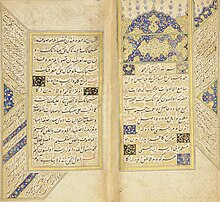You can help expand this article with text translated from the corresponding article in Arabic. Click for important translation instructions.
|
| This article needs additional citations for verification. Please help improve this article by adding citations to reliable sources. Unsourced material may be challenged and removed. Find sources: "Ebussuud Efendi" – news · newspapers · books · scholar · JSTOR (May 2024) (Learn how and when to remove this message) |
| Ebussuud Efendial-Mu'allim al-Thani (The Second Teacher) | |
|---|---|
 An early copy of Ebussuud's Du'anama ("Book of Prayers"), signed Muhammad Amin al-Husayni al-Tirmidhi, created in Ottoman Turkey, dated 1599–1600 An early copy of Ebussuud's Du'anama ("Book of Prayers"), signed Muhammad Amin al-Husayni al-Tirmidhi, created in Ottoman Turkey, dated 1599–1600 | |
| Ottoman Shaykh al-Islām | |
| In office October 1545 – 23 August 1574 | |
| Monarchs | |
| Preceded by | Fenarîzade Muhyiddin Çelebi |
| Succeeded by | Çivizade Damadı Hamid Efendi |
| Kazasker of Rumelia | |
| In office August 1537 – October 1545 | |
| Monarch | Suleiman I |
| Preceded by | Muhyiddin Efendi |
| Islamic Judge (Kadi) of Istanbul | |
| In office November 1533 – August 1537 | |
| Monarch | Suleiman I |
| Personal details | |
| Born | Mehmed Ebussuud El- İmadi bin Mutasavvıf Muhyiddin Mehmed (1490-12-30)30 December 1490 İskilip, Rûm Eyalet, Ottoman Empire |
| Died | 23 August 1574(1574-08-23) (aged 83) Ḳosṭanṭīnīye, Ottoman Empire |
| Spouse | Zeyneb Hanım |
| Parent | Mutasavvıf Muhyiddin Mehmed (father) |
Ebussuud Efendi (Turkish: Mehmed Ebüssuûd Efendi, 30 December 1490 – 23 August 1574), was a Hanafi Maturidi Ottoman jurist and Quran exegete, served as the Qadi (judge) of Istanbul from 1533 to 1537, and the Shaykh al-Islām of the Ottoman Empire from 1545 to 1574. He was also called "El-İmâdî" because his family hailed from Imâd, a village near İskilip.
Ebussuud was the son of Iskilipli Sheikh Muhiddin Muhammad Efendi. In the 1530s, Ebussuud served as a judge in Bursa, Istanbul and Rumelia, where he brought local laws into conformity with Islamic divine law (sharia). Sultan Suleiman the Magnificent promoted him to Shaykh al-Islām – the supreme judge and highest official – in 1545, an office Ebussuud held until his death and which he brought to the peak of its power. He worked closely with the Sultan, issuing judicial opinions that legitimised Suleiman's killings of Yazidis and his successor Selim's attack on Cyprus. Ebussuud also issued legal rulings (fatwās) which labeled the Qizilbash, regardless of whether they lived on Iranian or Ottoman soil, as "heretics", and declared that killing them would be viewed as praiseworthy, rather than just being allowed according to the law.
Together with Suleiman, the "Lawgiver", Ebussuud reorganized Ottoman jurisprudence and brought it under tighter governmental control, creating a legal framework joining sharia and the Ottoman administrative code (qānūn). While the previously prevailing opinion held that judges were free to interpret sharia, the law that even the ruler was subject to, Ebussuud instituted a framework in which the judicial power was derived from the Sultan and which compelled judges to follow the Sultan's qānūn-nāmes, "law-letters", in their application of the law.
In addition to his judicial reforms, Ebussuud is also remembered for the great variety of fatwās he issued. His opinions allowing Karagöz plays and the consumption of coffee, a novelty at the time, are particularly celebrated. He is also known for a widely-contested fatwā permitting monetary dealings involving riba (interest) in certain situations. This opinion is often referenced by contemporary Muslim modernists.
Footnotes
- Atâullah, Nev‘îzâde. Hadâiku'l-hakāik fî tekmileti'ş-Şekāik. Abdülkadir Özcan. p. 185.
- ^ İsmail Hâmi Danişmend, Osmanlı Devlet Erkânı, Türkiye Yayınevi, İstanbul, 1971, p. 114. (in Turkish)
- Imber, Colin. "Ebu's-Suud Efendi". Scribd. Retrieved 10 March 2024.
- Üskûbî, Pîr Mehmed. Fetâvâ-yı Üskûbî. Süleymaniye Esad Efendi 1094. pp. 6b.
- Dianat, Ali Akbar (2015). "Abū al-Suʿūd, Muḥammad b. Muḥammad b. Muṣṭafā ʿImādī". Brill. Encyclopaedia Islamica. Retrieved 10 March 2024.
- ^ Schneider, 192.
- Matthee 2014, p. 9.
- Schneider, 193.
- Omar Farooq, Dr. Mohammad (September 2007). "The Riba-Interest Equivalence: Is there an Ijma (consensus)?". Transnational Dispute Management. 4 (5): 9. SSRN 3036390 – via SSRN.
References
- Matthee, Rudi (2014). "The Ottoman-Safavid War of 986-998/1578-90: Motives and Causes". In Karpat, Kemal; Balgamış, Deniz (eds.). International Journal of Turkish Studies. Vol. 20, Nos 1& 2.
- Schneider, Irene (2001). "Ebussuud". In Michael Stolleis (ed.). Juristen: ein biographisches Lexikon; von der Antike bis zum 20. Jahrhundert (in German) (2nd ed.). München: Beck. p. 192. ISBN 3-406-45957-9.
Further reading
- Atçıl, Abdurrahman (2019). "II. Ottoman Religious Rulings Concerning The Safavids: Ebussuud Efendi's Fatwas". The Empires of the Near East and India. Columbia University Press. pp. 97–106.
- Repp, Richard C. (2009). "Abū l-Suʿūd". In Fleet, Kate; Krämer, Gudrun; Matringe, Denis; Nawas, John; Rowson, Everett (eds.). Encyclopaedia of Islam (3rd ed.). Brill Online. ISSN 1873-9830.
| Maturidi school of Sunni theology | ||||||||||||||||||||||||||
|---|---|---|---|---|---|---|---|---|---|---|---|---|---|---|---|---|---|---|---|---|---|---|---|---|---|---|
| Maturidi scholars |
|  | ||||||||||||||||||||||||
| Theology books | ||||||||||||||||||||||||||
| See also | ||||||||||||||||||||||||||
| Maturidi-related templates | ||||||||||||||||||||||||||
- 1490 births
- 1574 deaths
- Hanafis
- Maturidis
- Political people from the Ottoman Empire
- Sheikh-ul-Islams of the Ottoman Empire
- Quranic exegesis scholars
- Grand Muftis of Istanbul (Ottoman)
- 16th-century Muslim scholars of Islam
- Jurists from the Ottoman Empire
- 16th-century jurists
- People from İskilip
- Islamic scholars from the Ottoman Empire
- Shaykh al-Islāms
- Supporters of Ibn Arabi